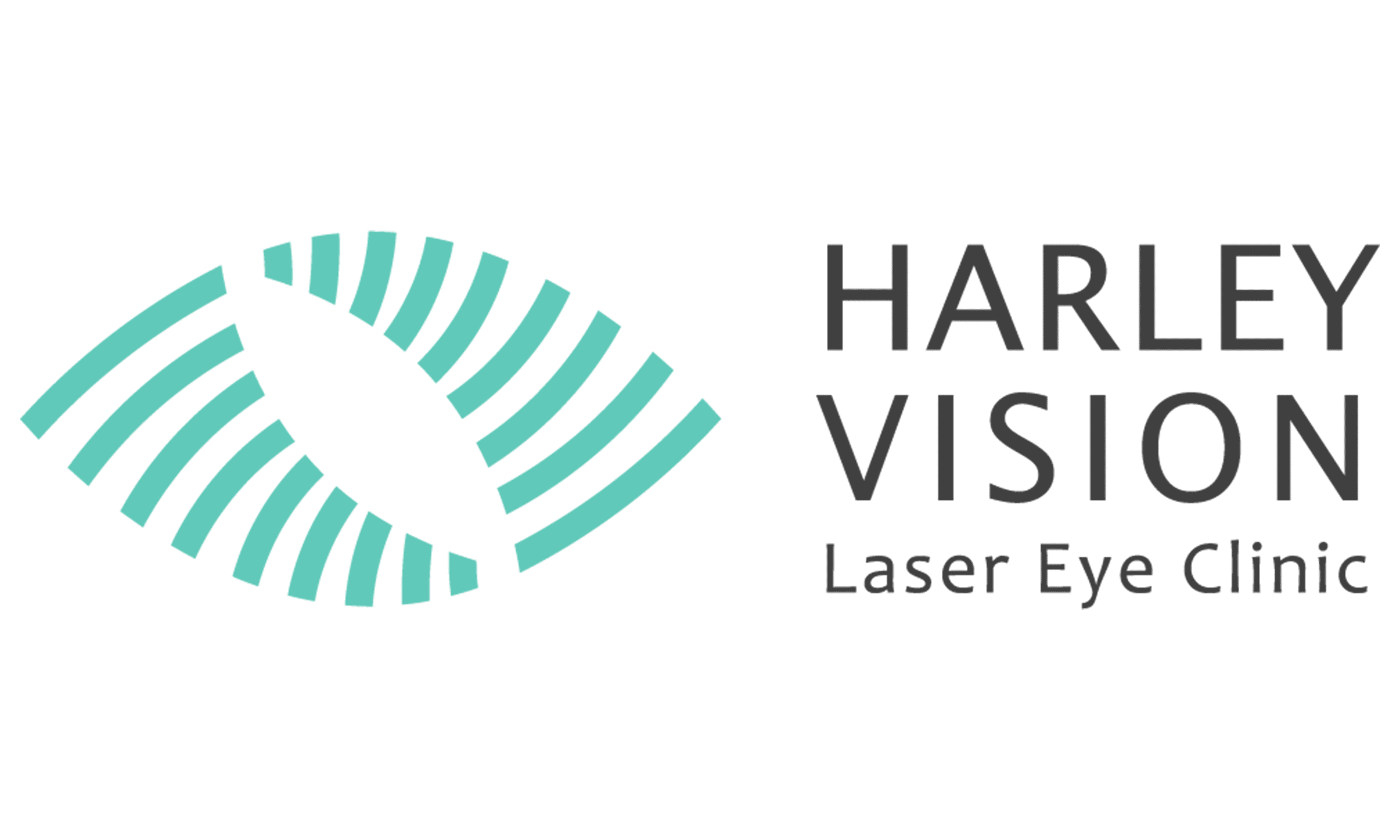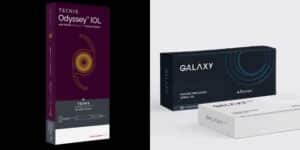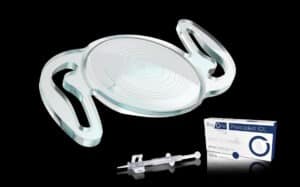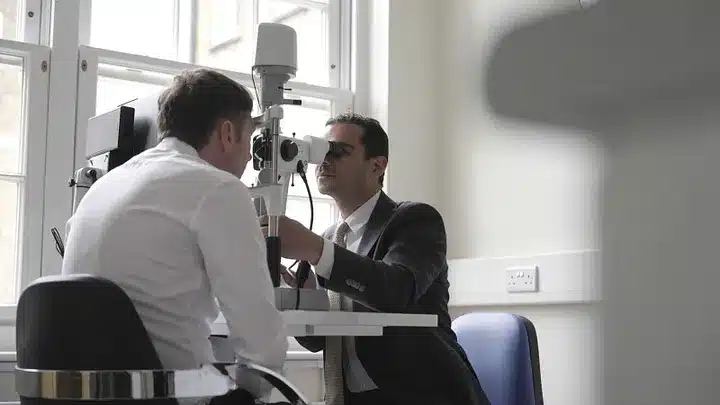
One of the most common questions patients ask when considering laser eye surgery is:
“Is vision correction surgery such as LASIK safer than wearing contact lenses?”
It’s a fair question. Contact lenses are often seen as low-risk because they’re familiar and widely used. But the reality, backed by peer-reviewed research, is surprising: for most people, laser vision correction is safer long-term than a lifetime of wearing contact lenses.
Let’s look at the risks and safety profiles of both options—and how Harley Vision in London ensures the highest possible safety standards.
The Hidden Risks of Contact Lenses 🩹
While contact lenses are convenient, they come with ongoing risks because they sit directly on the surface of your eye. Over time, this constant use increases the chances of complications.
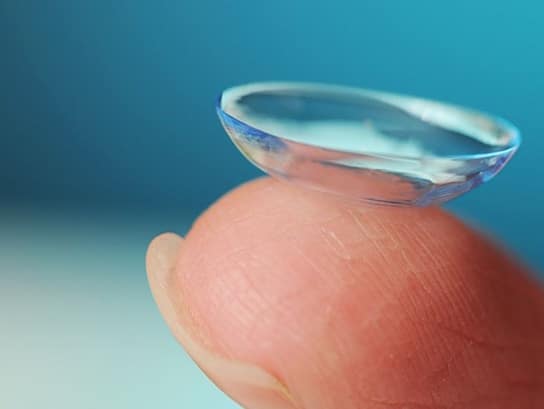
The most common risks include:
- Microbial Keratitis (corneal infection): The most serious risk, which can permanently damage vision. Research shows 1 in 500 contact lens users develops a serious eye infection each year—higher for those who sleep in their lenses (Bullimore & Johnson, 2020).
- Corneal Hypoxia: Lack of oxygen to the cornea, leading to scarring and an irregular surface leading to reduced vision.
- Corneal Neovascularization: To compensate for the lack of oxygen, the cornea may start to grow new blood vessels into its normally clear, avascular tissue. These new vessels can block vision and lead to further complication
- Swelling and Inflammation: Chronic oxygen deprivation can cause the cornea to swell, leading to discomfort and other eye health issues.
- Corneal Ulcers: Painful sores that can cause permanent vision loss if untreated.
- Inflammation and Allergies
- Giant Papillary Conjunctivitis (GPC): This condition causes the inner surface of the eyelid to become inflamed, swollen, and bumpy due to an allergic reaction to protein deposits on the lenses. Symptoms include itching, redness, and a feeling like something is stuck in the eye.
- Dry Eye Syndrome: A common complaint among contact lens wearers, this occurs when lenses absorb moisture from the eye’s tear film, leading to a feeling of dryness, irritation, and discomfort.
📊 Both LASIK and contact lenses are very safe when used appropriately. For people who wear daily disposable or daily-wear lenses, the long-term risk of severe vision loss is similarly low to having LASIK. The risk rises mainly with sleeping in lenses or poor hygiene. After screening, LASIK has a very low risk of serious complications.
The Safety and Effectiveness of Laser Eye Surgery: A Data-Driven Perspective
Laser eye surgery boasts an exceptional safety record globally, with serious complications occurring in less than 0.1% of cases. At Harley Vision, our meticulous patient selection process and adherence to stringent safety protocols further minimize these risks specifically for the LASIK and PRK procedures we offer.
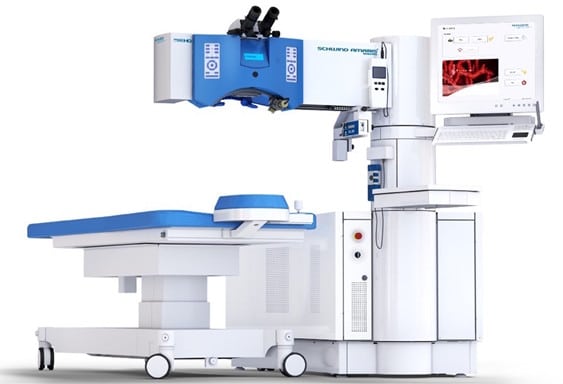
Common, Typically Temporary Side Effects:
- Dry eyes (managed with lubricating drops)
- Glare or haloes around lights, particularly at night
- Mild discomfort or a gritty sensation during the initial healing phase
Safety Comparison: Long-Term Risks – Laser Eye Surgery vs Contact Lenses
Contrary to common perception, long-term contact lens wear carries a significantly higher risk of serious eye infections, such as cornea infection, compared to laser eye surgery.
| Risk Factor | Contact Lenses (10 Years)* | Laser Eye Surgery (Lifetime)** |
| Serious Eye Infection | Approximately 1 in 2,000 per year | Less than 1 in 10,000 |
*Source: Peer-reviewed ophthalmology studies. **Source: Analysis of global laser eye surgery outcomes.
Laser eye surgery effectively reduces the long-term risks associated with continuous contact lens use.
Who Might Not Be Suitable for Laser Vision Correction? Exploring Other Options
While laser vision correction (e.g. LASIK and PRK) is a safe and effective option for many, it is not suitable for everyone. Certain factors can preclude someone from being a good candidate.
It’s crucial to have a comprehensive eye assessment at Harley Vision to determine your suitability for laser vision correction. If laser surgery is not the right option for you, the good news is that there are a plethora of other advanced surgical vision correction options available. These can you give you the same desired visual outcome, if not better in some cases. As your pre-surgery consultation is with an experienced surgeon, they will discuss suitable options with you in detail if applicable. Some alternatives to laser vision correction include:
- Implantable Collamer Lenses (ICL Surgery): An ICL is a small, biocompatible lens that is surgically implanted inside the eye, in front of the natural lens. This procedure is often suitable for individuals with higher degrees of myopia, astigmatism or hyperopia, and those who may not be candidates for laser eye surgery (e.g. due to thin corneas or dry eye concerns).
- Refractive Lens Exchange (RLE) or Lens Replacement Surgery: This procedure involves replacing the eye’s natural lens with an artificial intraocular lens (IOL). It is the same procedure used in cataract surgery. RLE can correct a wide range of refractive errors, including high myopia, hyperopia, and astigmatism. Lens replacement surgery is highly effective for treating individuals above the age of 45 years who are struggling with their near vision. At Harley Vision, we use the latest premium intraocular lenses to enable you to achieve excellent distance, intermediate and near vision after lens replacement surgery.
These alternative surgical options can provide excellent vision correction for individuals who are not suitable for LASIK or PRK. During your consultation at Harley Vision, the refractive surgeon will thoroughly evaluate your eye health and discuss all suitable surgical options to help you achieve your vision goals.
Effectiveness: Achieving Your Vision Goals
Over 95% of laser eye surgery patients achieve 20/20 vision or better after the procedure. Vision typically stabilizes within a few weeks, depending on the specific procedure performed. The results of laser eye surgery are generally long-lasting. However, it’s important to understand that natural age-related changes in the eye, such as presbyopia (typically occurring after age 40-45), can still necessitate the use of reading glasses for near vision tasks later in life.
Understanding the Cost of Laser Eye Surgery in London with Harley Vision
The cost of laser eye surgery in London can vary based on the specific procedure chosen and the advanced technology utilized. At Harley Vision, we are committed to transparent pricing and providing exceptional value for our LASIK and PRK services.
| Procedure | Typical Cost (per eye) |
| LASIK | £1,200 – £2,500 |
| PRK | £1,200 – £2,500 |
Please note that these are indicative costs for LASIK and PRK at Harley Vision, and a personalized quote will be provided after your comprehensive assessment, which may include financing options.
The Long-Term Financial Benefits: Laser Eye Surgery vs Glasses & Contact Lenses
When considering the long-term expenses associated with corrective eyewear, laser eye surgery often proves to be a cost-effective solution.
| Correction Method | Approximate 20-Year Cost |
| Laser Eye Surgery | £2,400 – £5,000 (one-off for LASIK/PRK at Harley Vision) |
| Glasses & Contacts | £6,000 – £12,000+ (recurring costs for frames, lenses, solutions, eye exams) |
Investing in LASIK or PRK at Harley Vision can not only liberate you from the daily hassle of glasses and contacts but also offer significant long-term financial savings.
Why Choose Harley Vision for Your Laser Eye Surgery Journey?
Choosing the right clinic and surgeon is paramount for a successful laser eye surgery experience. Here’s why Harley Vision stands out for LASIK and PRK procedures:
Meet Mr. Mukhtar Bizrah: Your Experienced and Trusted Clinical Director
Mukhtar Bizrah is the Clinical Director of Harley Vision. He is a consultant refractive, cornea and cataract surgeon at the Western eye hospital, Imperial College Healthcare NHS Trust, and ex-unit training lead for ophthalmology.
Mr Bizrah is multi-fellowship trained (UK & Canada) in advanced refractive, cataract and cornea surgery. He is one of the few ophthalmic surgeons in the world has achieved multi-board certification and fellowship recognition across the UK, USA, Canada and Europe:
- Fellow of the Royal College of Ophthalmologists (FRCOphth), UK
- Fellow of the American College of Surgeons (FACS), USA
- Fellow of the Royal College of Physicians and Surgeons of Canada (FRCSC), Canada
- Fellow of the European Board of Ophthalmology (FEBO), Europe
- Fellow of the World College of Refractive Surgery (FWCRS)
- Fellow of the Higher Education Academy (FHEA), UK
- Certificate in Laser & Refractive surgery (CertLRS), Royal College of Ophthalmologists, UK
State-of-the-Art Facilities and Uncompromising Standards
While Harley Vision operates as an independent clinic, all surgical procedures are performed at Care Quality Commission (CQC) registered hospitals renowned for their exceptional standards of care and patient safety, including:
- Harley Street Eye Centre (London)
- Hospital of St John and St Elizabeth (London)
- King Edward VII’s Hospital (London)
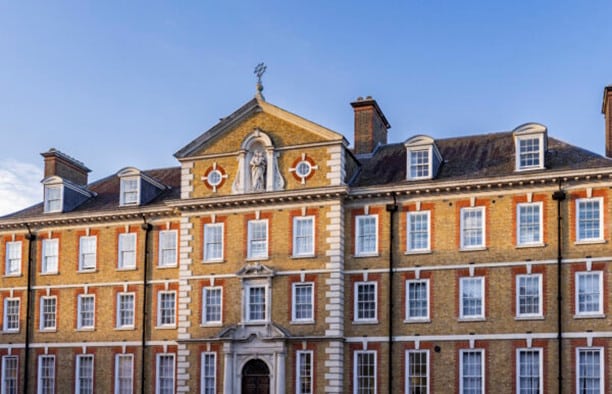
This ensures you receive the highest level of surgical expertise within a safe and well-equipped environment for your chosen LASIK, PRK or other vision correction surgery.
Personalized Treatment Plans: Tailored to Your Unique Needs
At Harley Vision, we understand that every eye and every vision goal is unique. We take the time to conduct thorough pre-operative assessments and develop personalized treatment plans specifically for LASIK and PRK to ensure the best possible outcomes for your individual circumstances and lifestyle.
Advanced Laser Technology: Precision for Optimal Results
Harley Vision is committed to investing in cutting-edge laser technology for our LASIK and PRK (LASEK) offerings. We utilize technology such as Schwind Amaris excimer laser and Ziemer Femtosecond laser to deliver precise and customized vision correction with wavefront technology.
Comprehensive Aftercare: Supporting Your Recovery
Our commitment to your vision extends beyond the surgery itself. Harley Vision provides comprehensive post-operative care and support specifically for LASIK and PRK patients to ensure a smooth and successful recovery. This includes scheduled follow-up appointments and readily available guidance.
Real Patient Experiences: Hear from Those Who Chose Harley Vision
“ Excellent service from start to finish. Fixed my very complex prescription completely and I no longer need glasses having had them since I was 4. Would recommend Harley Vision and Dr Bizrah highly, you will be in safe hands.” – Zac, UK
“I am hugely grateful to Mr Bizrah and all of the staff at the Harley Vision centre. I cannot in any way fault the service that was provided to me. They were all very professional, courteous and kind. Everything was clearly explained at every step, and they went over and beyond to make adjustments for me according to my situation. Being a doctor myself, I have worked with many clinicians over the years in my career. Mr Mukhtar Bizrah (who is well-known but I have never had any prior interactions with him) in particular stands out for me as not only does he have the accreditations of an excellent, world-class surgeon but he is also a very humble and down-to-earth individual who seems to be driven by a genuine desire to help every patient to the best of his ability. A flexible interest-free payment scheme was available. I could see the difference almost immediately and followups were arranged to ensure there were no issues. I have already recommended him to many of my family and friends.” – Safi, UK
‘“I’m writing this review one day after my Lasik surgery with Harley Vision performed by the Principle Ophthalmologist Mr Mukhtar Bizrah. Prior to the surgery I wore glasses every day to correct my very near sighted prescription. After being assessed in my 1-day follow-up appointment back at the clinic I now experience better than 20/20 acuity in both eyes. I feel like the gift of natural sight that I recall having as a young child has been restored to me for which I am eternally thankful. There were a number of Lasik providers that I had consultations with but I decided to go with Harley Vision due to the knowledge and Plan of Care (pre and post surgery) that Mr Bizrah presented to me in my initial consultation with him. I would also take this opportunity to commend the entire practice team who have been (and continue to be) diligent, proficient and helpful through every aspect of my process. Many thanks!!!” – Chris, UK
Frequently Asked Questions About Laser Eye Surgery at Harley Vision
Q: What laser technology do you use?
A: Our clinical director has treated patients using three of the world’s fastest and more precise laser technologies: Schwind eye-tech-solutions laser technology, iDesign laser technology and Zeiss Visumax/MEL90 lasers.
Modern state-of-the-art excimer lasers have similar accuracy and safety, giving you fantastic visual outcome. We use Schwind eye-tech-solutions laser technology, which has world-renowned precision and speed. However, we advise you to avoid getting stressed about the best laser technology as this stress is often the result of marketing.
What makes a big difference to laser eye surgery outcomes is more:
- Understanding your personal goals, visual requirements and expectations (extremely important)
- Pre-surgical assessment and testing
- Going for the correct type of refractive surgery (i.e. laser versus lens based surgery)
- Follow up and after-care
Q: Can I say goodbye to glasses and contact lenses forever?
A: Many people achieve such good vision they no longer need glasses or contacts for most of their daily activities. However, you might still prefer to use them for certain tasks, like reading small print or driving at night. It’s also important to note laser surgery doesn’t prevent age-related eye changes.
Q: Is laser refractive surgery safe?
A: Laser refractive surgery is one of the most common procedures worldwide, with a high success rate and low risk of severe complications. That said, it’s essential to discuss your individual risks and benefits with your surgeon.
In laser refractive surgery, the laser is applied on the transparent layer of the eye called the cornea, to modify its shape. If a cornea complication occurs, rest assured that our experienced, Mr Mukhtar Bizrah, is a cornea specialist. Mr Bizrah deals with all sorts of cornea problems and complications in his private and NHS practice, and often gets referred challenging cases. It is important to remember that most complications are manageable, and excellent vision can be achieved.
The success and safety of the surgery largely depend on the skills and experience of your surgeon, the technology and surgical technique used, and whether you’re a suitable candidate for the procedure. That’s why choosing the right surgeon and clinic for your laser refractive surgery is of utmost importance. With the right team supporting you, the journey to clearer vision can be both safe and liberating.
Q: Are contact lenses safer than laser refractive surgery?
A: Both contact lenses and laser refractive surgery have their own risks. Complications from contact lenses, such as infection, can occur but are typically rare and can be mitigated with proper hygiene and care. Laser refractive surgery also carries risks, though severe complications are quite rare. It’s important to note that unlike contact lenses, laser refractive surgery aims to provide a long-term solution to refractive errors. It’s best to discuss both options with your eye care specialist to understand which is most suitable for you.
Q: I am worried that I will be ‘pressured’ to have laser, when there may be another treatment option that is better and more permanent.
A: This is a valid and understandable concern. Some clinics or eye specialists offer only one service.
At Harley Vision, our surgeon Mr Bizrah performs both laser and lens based vision correction surgeries: e.g. LASIK, LASEK, ICL implantation, refractive lens exchange and cataract surgery.
So you never have to feel that my surgeon or eye clinic will offer me laser or lens based surgery because they do not do the other. At Harley Vision, we will advise you what we professionally think is the best and safest vision correction surgery procedure to give you maximum independence from eyeglasses and contact lens.
If you are still unsure after receiving medical advice, then having a second opinion is always an option you should consider. If you’d like to book an appointment at Harley Vision, please call our friendly team on 0207 030 3181 today.
Q: Is laser eye surgery more expensive than eyeglasses or contact lenses?
A: The upfront cost of laser refractive surgery can be higher than that of eyeglasses or contact lenses. However, considering the long-term expenses associated with updating prescription glasses or purchasing contact lenses and cleaning solutions, laser eye surgery could potentially save you money over time. It’s a one-time investment for years, possibly a lifetime, of clear vision.
Q: Can you guarantee 20/20 vision? i.e. Perfect vision!
A: Whilst we achieve 20/20 vision or better for the large majority of our patients, we do not promise 20/20 vision, or perfect vision. Just because some clinics make this false promise, it does not make it true or ethical.Honesty, transparency and compassionate care is at the heart of what we or any other ethical service should strive for.
Q: What is the success rate of laser refractive surgery?
A: Laser refractive surgery has a high success rate. According to various studies, more than 90% of patients achieve between 20/20 and 20/40 vision following the procedure, which is typically enough to carry out most daily activities without the need for corrective eyewear.
Your exact outcome can depend on several factors, including the severity and type of refractive error you have. Discussing your individual case with your surgeon will give you a clearer idea of the potential results.
Q: How soon after laser refractive surgery will I see clearly?
A: Most people notice an improvement in their vision immediately after surgery, but it can take several weeks for your vision to fully stabilize.
Q: Is laser refractive surgery painful?
A: The surgery itself should be painless. Before the procedure, numbing drops are placed in your eyes to ensure you remain comfortable throughout. Some people feel a slight pressure sensation, but you should not feel any significant pain during the surgery.
Q: Can anyone have laser refractive surgery?
A: While many people are suitable candidates, it’s not for everyone. Factors such as age, eye health, certain medical conditions, and the stability of your prescription can all impact whether or not you’re a good candidate.
Q: Is the laser refractive surgery procedure quick?
A: Yes, the application of laser on each eye only takes seconds. You can expect to be in the surgery suite for about 20–30 minutes though.
Q: Are the results of laser refractive surgery permanent?
A: Yes, the changes made to your cornea during surgery are permanent. However, it’s important to note that laser refractive surgery does not prevent normal age-related changes to your eyes.
In 2–3% of eyes, laser enhancement may be required. This is more common in people with certain prescriptions (refractive error), such as hypermetropia (long-sightedness), high myopia (severe short-sightedness) or significant astigmatism. Enhancement may be needed if there is significant regression (recurrence of refractive error), over-treatment or under-treatment of refractive error.
Q: Can laser refractive surgery treat presbyopia?
A: Some laser refractive surgery options can help manage presbyopia (age-related difficulty in reading without spectacles). For example, a procedure called monovision LASIK corrects one eye for distance vision and the other for close vision. This may not be suitable for everyone, so a detailed consultation with your eye surgeon is necessary. Our surgeons at Harley Vision offer various surgical solutions for presbyopia, and are not limited to laser.
Q: Are there age limits for laser refractive surgery?
A: While there isn’t a strict age limit, laser refractive surgery is generally recommended for adults from the age of 18 years. The vision prescription should be stable for at least a year before surgery. For older adults, the onset of cataracts or other age-related eye changes may impact the effectiveness of surgery.
Q: Will I still need reading glasses after the surgery?
A: If you’re over 40 and use reading glasses due to presbyopia, you might still need them after the surgery. However, there are certain techniques like monovision LASIK that can help reduce this need. There are other types of refractive surgery that can enable you to see distance and near vision, such as refractive lens exchange.
Q: How many times can you get laser refractive surgery?
A: Ideally, laser refractive surgery is a one-time procedure. In some cases (2–3%), a second surgery, or enhancement, might be necessary to achieve the best possible vision.
Q: What happens if I blink during laser refractive surgery?
A: There’s no need to worry about blinking. During the procedure, a device called a lid speculum is used to keep your eyelids open. At Harley Vision, we use ultra-advanced eye-tracking systems that ensure the laser stays focused on the correct part of your eye, even if your eye moves.
Q: Are the results of laser refractive surgery the same for everyone?
A: While most patients achieve 20/20 vision or better, the exact results can vary. Some factors that can affect the outcome include the severity of your refractive error, the type of procedure you have, and how your eyes heal after surgery.
Q: Do you offer 0% finance?
Laser refractive surgery is an investment in your vision. While the upfront cost is higher than that of glasses or contact lenses, in the long run, it can be a cost-effective solution, considering the recurring costs of glasses or contact lenses and their associated care.
At Harley Vision, we offer 0% finance to enable you to spread the cost of your eye surgery.
Take the First Step Towards Clear Vision: Book Your Free Consultation Today
Are you ready to explore the life-changing possibilities of LASIK or LASEK? Book your free, no-obligation consultation at Harley Vision, conveniently located in Harley Street, London. Our expert team, led by Mr Mukhtar Bizrah, is dedicated to providing you with personalized care and helping you achieve the clear, natural vision you’ve always dreamed of. Contact us today to schedule your assessment and take the first step towards a brighter, clearer future.
Harley Vision
📍 Location: Central London including Harley Street
📞 UK: 0207 030 3181
🌍 International: +44 207 030 3181
📧 Email: [email protected]
